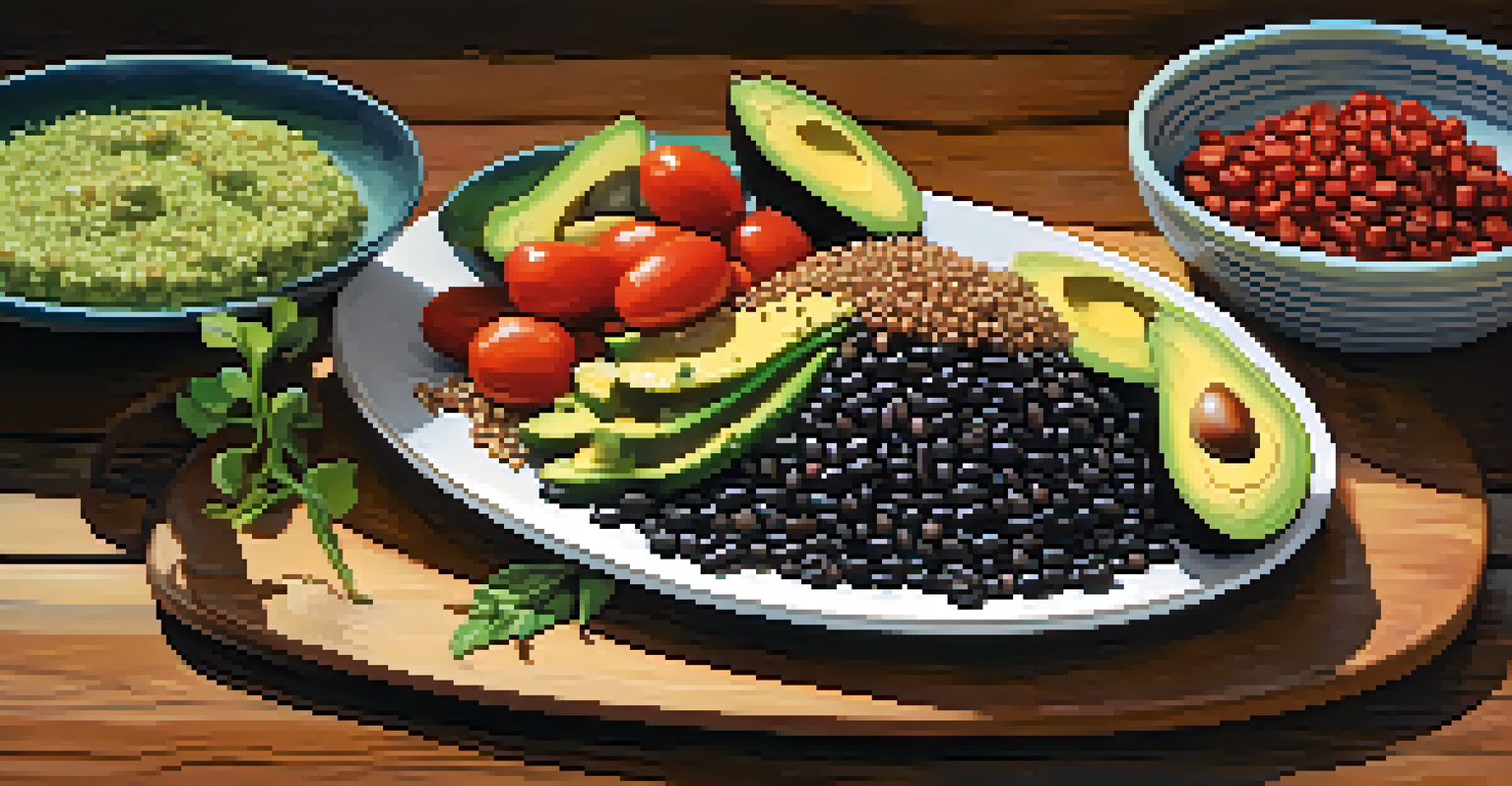Balancing Macronutrients on a Vegetarian Diet for Athletes

Understanding Macronutrients: The Building Blocks of Diet
Macronutrients are essential nutrients that provide energy and are crucial for bodily functions. They include carbohydrates, proteins, and fats, each playing a unique role in an athlete's diet. For vegetarian athletes, understanding how to balance these macronutrients is vital for optimal performance and recovery.
Let food be thy medicine and medicine be thy food.
Carbohydrates are the primary fuel source for athletes, providing the energy needed for intense workouts. Proteins are essential for muscle repair and growth, while fats support long-term energy and nutrient absorption. A well-balanced intake of these macronutrients can significantly enhance athletic performance.
For those following a vegetarian diet, it's important to source these macronutrients from plant-based foods. This can involve a mix of grains, legumes, nuts, seeds, and dairy or dairy alternatives, ensuring a well-rounded nutritional profile.
Carbohydrates: Fueling Your Workouts and Recovery
Carbohydrates are often referred to as the body's preferred source of energy, especially for athletes. They come in two main forms: simple carbohydrates, which provide quick energy, and complex carbohydrates, which offer sustained energy. For vegetarian athletes, foods like whole grains, fruits, and vegetables are excellent sources.

Incorporating carbohydrates into your diet is crucial, especially before and after workouts. A pre-workout meal rich in carbs can enhance performance, while post-workout carbohydrates help replenish glycogen stores depleted during exercise. It's all about timing your intake for maximum benefits.
Balance Macronutrients for Performance
Athletes, especially vegetarians, need to effectively balance carbohydrates, proteins, and fats to enhance performance and recovery.
Aim to include a variety of carbohydrate sources in your meals. Whole grains, legumes, and starchy vegetables can provide the energy needed for peak performance, making it easier to maintain intensity during training sessions.
Protein: Essential for Muscle Repair and Growth
Protein is the building block of muscles, making it essential for athletes who want to build strength and recover from workouts. For vegetarian athletes, finding quality protein sources is key, as many plant-based proteins may lack one or more essential amino acids. Combining foods like beans with rice or quinoa with lentils can help create a complete protein profile.
You are what you eat, so don’t be fast, cheap, easy, or fake.
The recommended protein intake for athletes is generally higher than for non-athletes, often around 1.2 to 2.0 grams per kilogram of body weight. This means vegetarian athletes must be mindful of incorporating sufficient protein-rich foods into their diets, such as tofu, tempeh, Greek yogurt, and legumes.
Consider spreading your protein intake throughout the day to maximize muscle repair and growth. Snacks like protein smoothies or hummus with whole-grain crackers can be easy ways to meet your protein needs in a vegetarian diet.
Fats: Important for Hormonal Balance and Energy
Fats often get a bad rap, but they are vital for overall health and energy, especially for athletes. Healthy fats, such as those found in avocados, nuts, seeds, and olive oil, play a crucial role in hormone production and nutrient absorption. They also provide a concentrated source of energy, which is particularly beneficial for endurance athletes.
Incorporating healthy fats into a vegetarian diet can be as simple as adding a handful of nuts to your oatmeal or using olive oil in salad dressings. These fats not only enhance flavor but also contribute to a balanced macronutrient profile.
Hydration is Key to Athletic Success
Staying hydrated is crucial for optimal athletic performance, impacting digestion, nutrient transport, and temperature regulation.
Remember, while fats are important, moderation is key. Aim for healthy fats to make up about 20-35% of your total daily caloric intake to maintain balance and support your athletic performance.
Meal Planning: Strategies for Balanced Nutrition
Effective meal planning can help athletes ensure they are getting the right balance of macronutrients. Start by creating a weekly menu that incorporates a variety of food sources to cover all three macronutrients. This not only simplifies grocery shopping but also encourages a diverse diet rich in essential vitamins and minerals.
Including snacks like nut butter on whole-grain toast or a smoothie with spinach, banana, and protein powder can help meet your dietary needs throughout the day. By planning meals with a mix of carbohydrates, proteins, and fats, you can prepare your body for optimal performance.
Don’t forget to listen to your body’s hunger cues. Adjust your meal sizes and snacks based on your daily activity levels to ensure you're fueling your workouts adequately.
Hydration: The Overlooked Key to Performance
While macronutrients are crucial, hydration is often overlooked as a key component of athletic performance. Water plays an essential role in digestion, nutrient transport, and temperature regulation, making it vital for athletes. Dehydration can lead to fatigue, decreased performance, and even injury.
Vegetarian athletes should focus on maintaining hydration levels by drinking water throughout the day and incorporating water-rich foods like fruits and vegetables into their meals. Electrolyte-rich beverages can also be beneficial during intense workouts or in hot weather.
Supplements Can Support Nutrition
While a well-planned vegetarian diet meets most nutritional needs, some athletes may benefit from supplements to fill any gaps.
A good rule of thumb is to drink enough water to ensure your urine is light yellow in color. Monitoring hydration can help you stay at the top of your game and support your overall health.
Supplements: When to Consider Extra Support
While a well-planned vegetarian diet can provide most of the necessary nutrients, some athletes may benefit from supplements. Common supplements among vegetarian athletes include protein powders, vitamin B12, iron, and omega-3 fatty acids. These can help fill any nutritional gaps and support overall performance.
Consulting a healthcare professional or nutritionist can help determine if supplements are necessary for you. They can provide guidance on which supplements might be beneficial based on your individual dietary needs and athletic goals.

Remember, supplements are meant to complement a balanced diet, not replace it. Focus on whole foods first, and use supplements as an additional resource to help you reach your performance potential.